21 Best Free & Public DNS Servers (for Every Country) in 2025
Changing your Domain Name Server (DNS) is an easy way to improve internet speeds and security. While there are many paid options, you’ll also find some excellent free DNS server providers. Make sure you choose carefully — not all DNS servers are better than the default settings assigned by your Internet Service Provider (ISP).
To help you choose, I tested and ranked the top 26 free and public DNS servers. However, using public DNS servers may expose your device to cyberattacks. For better online security, always use a VPN to encrypt your data. The best VPNs have their own DNS servers.
You can try ExpressVPN for fast and safe internet browsing. It uses top encryption, has a no-log policy, and protects against leaks to keep your data private. There’s even a 30*-day money-back guarantee. When I tested it, I got my refund in 4 days — no questions asked. Editor’s Note: Transparency is one of our core values at WizCase, so you should know we are in the same ownership group as ExpressVPN. However, this does not affect our review process, as we adhere to a strict testing methodology.
Quick Guide: Best Free & Public DNS Servers in 2025
- Google Public DNS — Enhances speed, safeguards against cyber threats, and supports IPv6, but may log some data.
- Cloudflare — Provides rapid browsing and robust privacy, but lacks ad-blocking features.
- OpenDNS — Offers content filtering and phishing protection, but configuration can be challenging.
- Quad9 — Blocks access to malicious websites with a broad server network, but collects anonymized data for analysis.
- DNS.Watch — Provides uncensored, no-logging DNS service through German servers for fast local access, but lacks built-in malware or ad-blocking features.
What DNS Servers Are and Why You Should Change Yours
The Domain Name System (DNS) works like a phone book for the internet. It translates user-friendly website addresses, such as www.wizcase.com, into IP addresses that browsers understand. When you type a website name into your browser, the DNS quickly changes it to the website’s IP address.
DNS information is kept on servers all over the world and operates through global networks. These servers interact when a DNS request is made, such as when you enter a URL and press “Enter.” This ensures you can access the website you need by matching your DNS request with the appropriate data response, all within milliseconds.
Opting for a free public DNS server over your Internet Service Provider (ISP) can offer the following advantages:
- Speed: Public DNS servers are often faster than those provided by ISPs due to closer geographic locations, enabling quicker DNS request resolutions.
- Security: Public servers generally provide advanced security features, including malware filtering, ad blocking, and parental controls, which may not be available on ISP servers.
- Privacy: While ISPs may collect and sell this data, some third-party DNS services promise greater privacy by not logging your web activity.
- Censorship: If your government or ISP is blocking access to certain websites through DNS, using a different DNS server might allow you to bypass these blocks.
- Reliability: If your ISP’s DNS servers are down or facing issues, using a reliable third-party DNS server can offer better uptime.
It’s also worth noting that changing your DNS server has risks. An untrustworthy DNS server could slow performance or pose security threats. So always ensure you trust the provider of the DNS server before making a switch. If you’re privacy-conscious, consider a no-logs VPN like ExpressVPN to anonymize your DNS requests and protect your identity.
The Best Free and Public DNS Servers in 2025
1. Google Public DNS — Great Combination of Speed and Security

- Primary DNS Address: 8.8.8.8
- Secondary DNS Address: 8.8.4.4
Google Public DNS is known for fast and secure internet browsing. It uses a smart system called AnyCast to connect you to the closest data center, ensuring speedy browsing. Additionally, it ensures your safety online by preventing attacks like DDoS and redirecting searches from suspicious websites.
Setting up Google Public DNS is simple, and it supports both IPv4 and IPv6 connections for compatibility. Google is known for its reliability, so you shouldn’t have any issues with DNS resolution. However, like any service, occasional disruptions can occur.
However, it collects and logs information about your DNS queries, which can be used for user-targeted ads or legal compliance. Additionally, its basic support may be challenging for non-experts, and it has limited content filtering and parental control options.
2. Cloudflare — Lightning-Fast Speeds for Uninterrupted Gaming
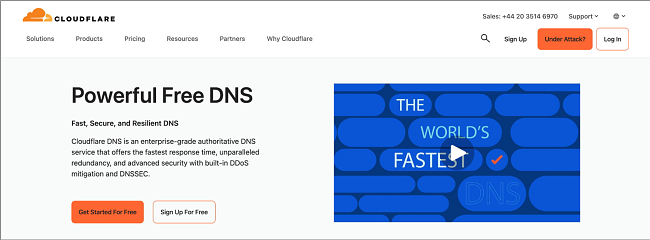
- Primary DNS Address: 1.1.1.1
- Secondary DNS Address: 1.0.0.1
Cloudflare is known for its superfast speeds, which average 12.94 milliseconds (ms) — faster than many Internet Service Providers (ISPs). Its huge network of servers spread across more than 200 locations worldwide ensures minimal delay, which is great for activities like gaming.
Cloudflare shows its dedication to improving services for gaming through its mobile app, 1.1.1.1 with Warp. This app boosts mobile gaming performance and uses advanced protocols to secure your phone’s internet connection. While ad-blocking and customizable site blocking are not available, its 1.1.1.1 service for families offers protection against malware and adult sites.
In terms of security, Cloudflare uses advanced methods like DNS over HTTPS and DNS over TLS. These strengthen its system against possible threats and stop data from leaking. Other safety features include a global Content Delivery Network (CDN), 3 age Rules, and unmetered DDoS mitigation, ensuring stable and safe connections.
Cloudflare respects your privacy by deleting all logs within 24 hours and doesn’t gather any IP addresses or use your information for targeted advertising. Some drawbacks, however, include a lack of customization for website blocking and occasional issues with DNS resolution, as reported by some users.
3. OpenDNS — Best for Families With Adult Content Filter
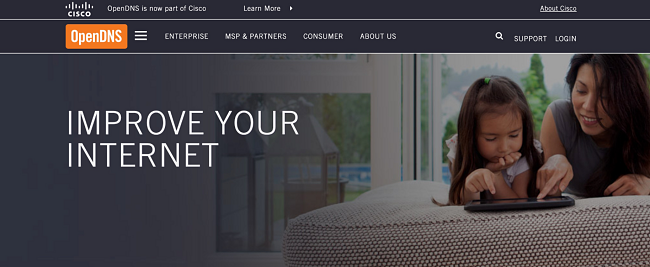
- Primary DNS address: 208.67.222.222
- Secondary DNS address: 208.67.220.220
Cisco’s OpenDNS is a highly recommended DNS service, particularly for families. It offers 2 services:
- FamilyShield — allows content control for kids and businesses and the ability to block certain websites or all adult content
- Home — emphasizes speed and security
Switching DNS servers can lead to configuration issues due to different cache systems. OpenDNS addresses this issue by deleting your DNS data, minimizing the likelihood of a poor connection. It uses AnyCast routing for quicker DNS loads and has servers on 3 continents with self-healing technology for constant uptime.
However, you’ll need to create an account and provide personal details to use OpenDNS, which means you won’t remain anonymous. Additionally, OpenDNS’s operating system may be a bit complex for beginners, but its website offers instruction manuals for all systems and even provides email support.
4. Quad9 — Easily Blocks Malicious Sites and Phishing Scams
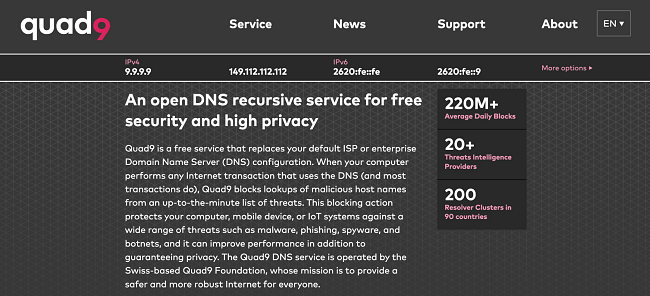
- Primary DNS address: 9.9.9.9
- Secondary DNS address: 149.112.112.112
Quad9 provides robust security against malware and malicious websites by using DNSSEC extensions. These extensions authenticate DNS queries, preventing domain spoofing and other online threats. Also, Quad9 collaborates with 13 cybersecurity firms to enhance its real-time threat detection capabilities, making it highly effective against phishing and malware.
Quad9 has a wide-reaching server network in over 145 locations, ensuring reliable and fast connections no matter where you are. It prioritizes user privacy by not collecting IP addresses or any personal data that can identify you. Quad9 also allows you to use its services without creating an account, further boosting your overall privacy.
The drawbacks of Quad9 include the absence of content filtering, which restricts the ability to block specific sites for increased safety. Its loading speeds also lag behind those of Cloudflare and OpenDNS, resulting in slightly delayed website loading times. Moreover, Quad9 provides limited setup instructions for Windows and Mac users compared to other free DNS servers.
5. DNS.Watch — Uncensored Internet for European Users
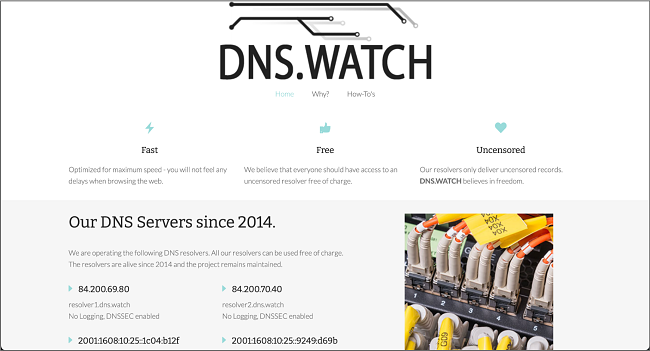
- Primary DNS address: 84.200.69.80
- Secondary DNS address: 84.200.70.40
DNS.Watch offers uncensored internet access through 2 servers in Germany, providing fast speeds for local users. DNS.Watch stands out for its strict no-logging policy, ensuring your personal information is never stored. Additionally, it operates through donations, ensuring that there is no motivation to store or trade your data.
When you choose DNS.Watch, you can trust that your Internet Service Provider won’t interfere with your DNS requests. DNS.Watch handles every query reliably, ensuring smooth and uninterrupted service. It is compatible with Mac, Windows, and Linux devices, making it suitable for integration across different platforms.
Keep in mind that if you’re outside of Europe, DNS.Watch may be slower because its servers are concentrated in Germany. It also does not have built-in features to block ads or malware, so I recommend using antivirus software or browser extensions alongside DNS.Watch.
6. Yandex.DNS — One of the Best DNS Servers for Western Europe
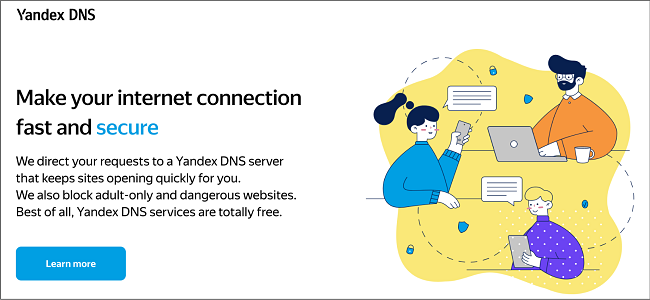
- Primary DNS address: Basic 77.88.8.8 | Safe 77.88.8.88 | Family 77.88.8.7
- Secondary DNS address: Basic 77.88.8.1 | Safe 77.88.8.2 | Family 77.88.8.3
Yandex.DNS is one of the best DNS servers in Western Europe, with most of its servers based in Russia. By using its free public DNS servers, you can experience seamless internet browsing with an impressive uptime of 99.95%. This means you won’t run into service disruptions and can browse the web without interruption.
It provides 3 services: Basic, Safe, and Family. While all services block malware, harmful sites, and ads, and can be customized to your specific needs, they offer varying security and censorship settings:
- Basic — emphasizes speed
- Safe — offers enhanced security against threats like viruses and DDoS attacks
- Family — features stringent content filters.
Unfortunately, its Russia-based operations pose auditing challenges around ethical practices related to internet freedom. Furthermore, Yandex.DNS shares your data with third parties and its parent company, compromising privacy.
7. Vercara UltraDNS Public — A Customizable DNS Great for Family Protection
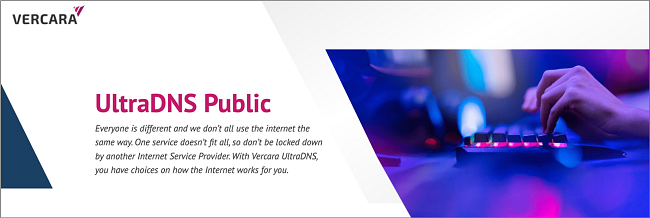
- Primary DNS address: Unfiltered 64.6.64.6 | Threat Protection 156.154.70.2 | Family Secure 156.154.70.3
- Secondary DNS address: Unfiltered 64.6.65.6 | Threat Protection 156.154.71.2 | Family Protection 156.154.71.3
Vercara UltraDNS (formerly Neustar UltraDNS) offers a secure DNS solution tailored to the needs of families. What sets it apart is the customizable filter embedded in its family service, empowering you to personalize your online experience by blocking specific websites.
It presents 3 distinct versions: Unfiltered, Threat Protection, and Family.
- Unfiltered — provides fast speeds and reliable DNS query solving without censorship
- Threat Protection — blocks malware, spyware, phishing, and ransomware
- Family — includes all the threat protection features and allows you to customize it to block adult and gambling sites.
With a vast network of over 30 DNS nodes across the globe, Vercara UltraDNS delivers exceptional speeds and minimal latency. It’s important to note that these advantages are primarily accessible through Vercara’s top-level DNS servers, so the extent of these benefits may vary depending on your geographical location.
One drawback of using Vercara UltraDNS is its data collection practices. The service gathers various information, such as your IP address, time, date stamps, and DNS queries. However, it does offer an opt-out feature, enabling you to reduce the amount of collected data and mitigating the risk of interception by third parties like hackers.
8. CleanBrowsing DNS — Secure With Family-Focused Web Filters

- Primary DNS address: Family 185.228.168.168 | Adult 185.228.168.10 | Security 185.228.168.9
- Secondary DNS address: Family 185.228.169.168 | Adult 185.228.169.11 | Security 185.228.169.9
CleanBrowsing is another family-oriented DNS, with server options available in the US and Europe. Its services come in three variations: Security, Adult, and Family. Security thwarts malware, while Adult covers malware and adult content. Family combines malware and adult content blocking with Safe Search filters in browsers.
The service prioritizes your online anonymity by concealing your IP address, browsing history, and third-party DNS requests. Moreover, unlike other DNS servers that redirect blocked or unresponsive pages to tracking sites, CleanBrowsing avoids this inconvenience altogether.
To maximize protection and privacy, CleanBrowsing employs the robust DNSCrypt and DNS over HTTPS protocols. These encryption methods fortify your connection, providing an additional layer of security. Additionally, CleanBrowsing is fully compatible with IPv6 connections, further expanding its reach and accessibility.
Nevertheless, it is essential to note that CleanBrowsing’s functionality is limited. While it excels at blocking adult sites and filtering content, it does not offer unrestricted internet access beyond these features.
9. Comodo Secure — Avoid Phishing Schemes With Strong Security Features
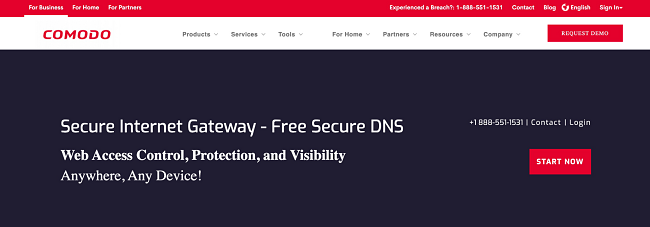
- Primary DNS address: 8.26.56.26
- Secondary DNS address: 8.20.247.20
Comodo Secure is designed to keep you safe from harmful elements like ads, spyware, malware, phishing, and command-and-control callbacks. It achieves this by maintaining a constantly updated list of blocked websites, with over 80 categories. You’ll receive pop-up notifications before visiting any site on the blocklist, ensuring real-time protection.
Designed to be fast and reliable, Comodo Secure is a great DNS server for anyone who needs fast speeds to stream or play games. It boasts a wide server network across 5 continents, guaranteeing a trustworthy connection wherever you are.
Moreover, Comodo Secure delivers comprehensive protection regardless of your location, both on and off your network. To keep you well-informed about potential threats, it offers real-time reporting, empowering you to stay ahead of any risks to your internet connection. Setting up is a breeze with easy-to-follow instructions for Windows, Macs, Chromebooks, and routers.
The only concern is that it collects your data for marketing and analytical purposes. As such, you may be more susceptible to cyberattacks. This includes your IP address and name if you provide it voluntarily. Consequently, it’s crucial to consider potential cyberattacks that may arise due to this data collection.
10. UncensoredDNS — Ensure Your Privacy With No Sensitive Data Logs

- Primary DNS address: 91.239.100.100
- Secondary DNS address: 89.233.43.71
UncensoredDNS doesn’t record your online activity, so you can be confident that your online activity won’t be traced. It only collects a small amount of non-personal data, like the number of DNS requests you make and aggregate query graphs, but none of your personal details are collected.
Its servers are primarily in Denmark, which means if you’re in Europe, you can expect a quick and smooth internet experience. UncensoredDNS doesn’t limit or block any content online, and it supports IPv6 connections, which offer you a wider range of IP addresses for faster internet speeds.
However, UncensoredDNS lacks strong security measures like an ad blocker. It can’t stop harmful websites and ads, so if you’re worried about security threats or cyberattacks, it’s best to use it with a VPN.
11. SafeServe — Simple Setup on All Devices but Lacks Privacy
- Primary DNS address: 198.54.117.10
- Secondary DNS address: 198.54.117.11
SafeServe is an easy-to-use service that helps keep your online information private. It’s easy to set up, with clear instructions for major operating systems. The best part is that you don’t even need to make an account.
SafeServe’s primary advantage lies in its use of Transport Layer Security to shield your DNS requests and personal data from third-party access. This protective layer offers added peace of mind, securing your personal data from unwanted access or interference.
However, the service lacks malware protection, leaving you vulnerable to certain online threats. Additionally, SafeServe collects user data, including IP addresses, which it shares with parent company Namecheap. This practice may expose users to targeted advertisements or cyberattacks.
12. SafeDNS — Fast Browsing With Limited Privacy
- Primary DNS address: 195.46.39.39
- Secondary DNS address: 195.46.39.40
SafeDNS is a cloud-based DNS service that ensures fast and uninterrupted browsing through its globally distributed AnyCast network. It uses advanced artificial intelligence for content filtration and blocking sites hosting malicious ads or malware, making it a great choice for parents who want to protect their kids online.
However, it is worth noting that SafeDNS does collect certain personal data, including IP addresses. Setting up SafeDNS might also be a bit challenging if you’re not tech-savvy, but the service provides helpful guides for easy installation on popular operating systems.
13. AdGuard — Block Ads Without Hassle While Being Tracked
- Primary DNS address: 176.103.130.130
- Secondary DNS address: 176.103.130.131
AdGuard is an excellent DNS server for anyone who wants to block ads. It has 2 main options: Default and Family. The Default option blocks ads and bad software that could harm your device. The Family option does all this, plus it blocks adult content.
The Family option also keeps you safe in other ways. It stops you from visiting websites that might be dangerous, blocks trackers that watch what you do online and filters out inappropriate content when you search the internet.
Another benefit is that AdGuard is easy to set up and works on major operating systems without any additional installations. However, like most free DNS servers, it collects your data and tracks your internet activity. But don’t worry; it doesn’t share this information with others, so you’re protected from targeted ads and potential cyberattacks.
14. Control D — Bypass IP Blocking and Manually Configure Based on Your Needs
- Primary DNS address: 76.76.2.0
- Secondary DNS address: 76.76.10.0
Control D is another excellent DNS choice, offering multiple server options to fulfill your needs. You can choose servers that unblock websites, block ads and trackers, or block social networks and adult content. Moreover, it has a basic option called “unfiltered” that focuses strongly on protecting the privacy and security of your DNS queries.
If you want more control over your DNS settings, Control D lets you make personalized configurations. You can use different filters to block trackers, ads, malware, phishing schemes, and even government sites. It also offers additional premium filters at an affordable price, so you can protect your online privacy without spending too much money.
However, before choosing Control D as your DNS server, note that it lacks security benefits and won’t protect against cyberattacks or unblock restricted sites. Additionally, using Control D doesn’t ensure complete anonymity, as your Internet Service Provider (ISP) can still access browsing history and data.
15. Alternate DNS — Blocks Ads but Without Adequate Privacy Protection
- Primary DNS address: 76.76.19.19
- Secondary DNS address: 76.223.122.150
Alternate DNS is an excellent option if you’re tired of being constantly interrupted by ads while browsing. Beyond ad blocking, it supports IPv6 connection for better security and larger address space. In addition, it impressed me with its fast and reliable servers, which ensure that my browsing experience is consistently smooth and uninterrupted.
Unfortunately, Alternate DNS collects personal information as part of its service. This includes personal details like your name, email, IP address, phone number, and credit card information. This information is kept for an unspecified “reasonable time” after providing the service, potentially leaving sensitive or personal data vulnerable.
16. Level 3 (CenturyLink) — Reliable Connections but Not During Routine Maintenance
- Primary DNS address: 205.171.3.65
- Secondary DNS address: 205.171.2.65
Level 3 is backed by Lumen’s network infrastructure and is designed to provide a reliable, high-speed connection. Numerous users have shared positive feedback about its stable connections and faster speeds compared to their usual internet providers. However, everyone’s experience might be different, so it’s best to check the connection yourself.
Additionally, Level 3 is user-friendly and is compatible with various router models. The setup process is extremely straightforward and can be completed in under 2 minutes by following the instructions provided on its website.
That being said, Level 3 may have temporary slowdowns during maintenance of its premium hardware. Thankfully, these instances are rare and short-lived, so they shouldn’t cause you much inconvenience.
17. CIRA Canadian Shield — Enhanced Cybersecurity Protection but Limited to Canada
- Primary DNS address: 149.112.121.10
- Secondary DNS address: 149.112.122.10
The most significant advantage of CIRA Canadian Shield is its built-in cyber security. It uses advanced AI to constantly detect and flag 100,000 potential online threats. This feature keeps you safer from cyberattacks and makes sure your browsing is secure. It also blocks annoying ads, trackers, and harmful software.
However, it’s important to note that CIRA Canadian Shield’s servers are only located in Canada. So if you’re in Europe or anywhere else, you won’t experience the same fast speeds and quick loading times that Canadian users enjoy for free.
18. Hurricane Electric — Wide Server Network but Lacks IP Anonymity
- Primary DNS address: 74.82.42.42
- Secondary DNS address: –
Hurricane Electric provides access to a range of global DNS servers that offer impressive speed.
Unlike some other free and public DNS providers, its infrastructure tends to be more stable, reducing the frequency of potential issues.
Nevertheless, it’s important to highlight that its technical support might not always be reliable for addressing DNS server problems. It’s also worth noting that Hurricane Electric’s DNS servers do not hide your IP address, potentially leaving you vulnerable to identification by unauthorized individuals or third parties.
19. Freenom World — Fast Speeds With Potential Resolution Issues
- Primary DNS address: 80.80.80.80
- Secondary DNS address: 80.80.81.81
Freenom World offers reliable speeds and has a broad global network, providing consistent connectivity worldwide. The service also prioritizes privacy by not collecting any IP information, which helps to keep your anonymity secure.
However, using Freenom World may come with some challenges, and you may have difficulties in resolving DNS requests through your server. To address this issue, you can try resetting your router or opting for a reliable VPN service that offers a wide range of servers.
20. DNS for Family — Customizable Content Filtering With No Ad-blocking Protection
- Primary DNS address: 94.130.180.225
- Secondary DNS address: 78.47.64.161
DNS for Family is a service that helps families have a safer browsing experience. It filters content, so you can easily block certain websites or types of content that you don’t want your family to access. You can customize the settings to fit your family’s needs and make sure your children have a suitable online experience.
Another important thing to know is that DNS for Family values privacy. It doesn’t keep track of your browsing data, so your online activities remain secure and private. However, it’s worth mentioning that DNS for Family doesn’t have advanced security features like an ad blocker or protection against phishing.
21. FlashStart — Privacy-Preserving but Requires Technical Expertise for Setup
- Primary DNS address: 185.236.104.104
- Secondary DNS address: 185.236.105.105
FlashStart DNS helps organizations and schools keep their internet browsing safe and secure. It has a lot of useful features to block inappropriate content like adult material, violence, and gambling.
The service goes beyond content filtering by providing protection against malware and phishing attempts, safeguarding you from accessing malicious websites or falling for scams. The FlashStart servers are based in Italy, ensuring a swift and steady connection for European users.
While it does record some minimal usage data for analytical purposes, it maintains user privacy by refraining from collecting any personally identifiable information. Also, setting up FlashStart DNS might be a bit tricky for non-technical people because it requires some knowledge of networking and advanced filtering rules.
Quick Comparison: 2025’s Best Free, Public DNS Servers
| DNS Provider | Best For | DNS Address | IPv6 Support |
| Google Public DNS | Reliable and fast DNS resolution, suitable for general use | Primary: 8.8.8.8
Secondary: 8.8.4.4 |
Yes |
| Cloudflare DNS | Security-focused DNS protects against DDoS and malware attacks | Primary: 1.1.1.1
Secondary: 1.0.0.1 |
Yes |
| OpenDNS | Content filtering and parental controls, ideal for families | Primary: 208.67.222.222
Secondary: 208.67.220.220 |
Yes |
| Quad9 | Enhanced privacy and security, blocks malicious websites | Primary: 9.9.9.9
Secondary: 149.112.112.112 |
Yes |
| DNS.Watch | Privacy-focused DNS, does not log user queries | Primary: 84.200.69.80
Secondary: 84.200.70.40 |
Yes |
| Yandex.DNS | DNS with built-in protection against fraudulent and phishing sites | Primary: 77.88.8.8
Secondary: 77.88.8.1 |
Yes |
| Vercara UltraDNS Public | Enterprise-grade DNS, designed for businesses and organizations | Primary: 156.154.70.1 Secondary: 156.154.71.1 |
Yes |
| CleanBrowsing DNS | Family-friendly DNS blocks adult content and explicit websites | Primary: 185.228.168.9
Secondary: 185.228.169.9 |
Yes |
| Comodo Secure | Security-focused, incorporates malware domain filtering | Primary: 8.26.56.26
Secondary: 8.20.247.20 |
Yes |
| UncensoredDNS | An uncensored DNS server, no logging of user queries | Primary: 91.239.100.100
Secondary: 89.233.43.71 |
Yes |
How to Choose the Best Free Public DNS Server
When choosing the best free public DNS server, there are several factors you should consider. Here are some steps to help you make an informed decision:
- Assess reliability and uptime: Look for DNS servers with a reputation for high uptime and reliability. Check if the server has multiple redundant locations and if they offer any service level agreements (SLAs) guaranteeing uptime.
- Consider speed: DNS server speed impacts how quickly websites load. Look for DNS servers with a vast network infrastructure and multiple global data centers. Low latency and fast response times are desirable features.
- Check for security features: DNS servers can provide additional security features like malware blocking, phishing protection, and DNSSEC. Consider servers that offer these features to enhance your online security.
- Consider your location: DNS resolution speed can vary based on your geographical location. Some DNS servers have distributed server locations worldwide, which can provide faster resolution times for users in different regions. Choose a server with geographically distributed servers to minimize latency.
- Privacy considerations: Some DNS servers may collect user data for various purposes. Look for servers that prioritize user privacy and have a clear privacy policy.
- Consider additional features: Some DNS servers offer additional features like content filtering, parental controls, and customizability. Assess whether these features align with your requirements.
Warning: The Hidden Downsides of Free and Public DNS Servers
Using free public DNS servers might seem appealing, but they come with hidden issues. The biggest threat is to your privacy. These services can track what you do online and use this information for targeted ads or sell it to others. They’re also not as secure as paid options, leaving you vulnerable to cyberattacks like hackers redirecting you to harmful sites.
Another problem is that the servers aren’t always reliable. The actual speed can vary a lot, especially if you’re far from the server or if the server gets too busy or stops working. Plus, these services usually don’t offer help if you run into any problems. This leaves you to fix them on your own, which can be difficult if you’re not tech-savvy.
However, combining a VPN with a DNS server significantly increases your protection level online. A VPN hides your internet activity and your location, while a reliable DNS server makes sure you go to the right websites and protects you from attacks. Together, they offer a more secure, private, and dependable web experience.
Following an extensive evaluation of over 30 top VPNs, ExpressVPN stood out due to its private DNS servers, verified no-logs policy, and robust encryption. You can try ExpressVPN without risk, as all packages offer a 30*-day refund guarantee. I put this to the test and got my money back within 4 days of asking for a refund via live chat.
The Best VPN Alternatives to Change Your DNS Server in 2025
1. ExpressVPN — The #1 VPN for Superfast Speeds With Private DNS on Every Server Worldwide
Key Features:
- 3,300+ servers in 105 countries, all with integrated private DNS
- Superfast speeds for uninterrupted browsing and unlimited DNS requests
- Connect to its DNS servers on 8 devices simultaneously
- Compatible with Windows, macOS, Android, iOS, Xbox, PlayStation, and more
- 24/7 live chat and customer support if problems arise
- Try it risk-free as it’s backed by a 30*-day money-back guarantee
ExpressVPN is the best DNS server alternative, providing private DNS on all 3,300+ servers in 105 countries. This means you’ll be able to browse the web with an added layer of privacy and security, regardless of your location. In my ExpressVPN tests, I saw a 6% speed drop, and web browsing remained smooth with fast DNS requests and no noticeable delays.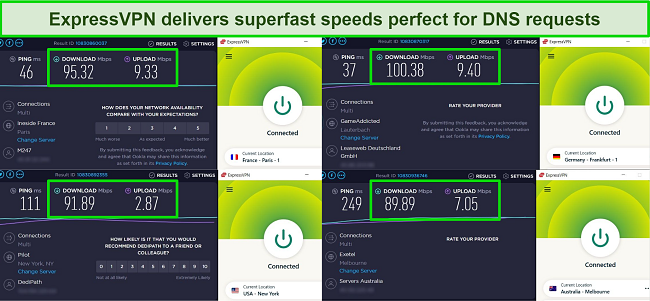
Advanced security features usually not found on free and public DNS servers allow you to remain anonymous and secure against cyber threats, including:
- DNS and IP protection — constantly hides your location and IP address, ensuring third parties and your ISP can’t access your online activities.
- TrustedServer technology — relies on RAM-only servers, significantly reducing the chance of unwanted interception from hackers, prying eyes, or governmental entities.
- AES-256 encryption — this standard is used by the US government for secure information protection, ensuring your data remains private.
With ExpressVPN, you can access its DNS servers on up to 8 devices simultaneously, including Android, iOS, Windows, macOS, Xbox, PlayStation, and more. This means that you’ll be able to overcome your ISP’s slow speeds on all your devices and won’t need to worry about DDoS attacks, cache poisoning, or malware when sending DNS requests.
As one of the best VPNs on the market, ExpressVPN ensures that you can stream seamlessly across multiple platforms with its fast connection. These platforms include:
| Netflix (US, UK, & more) | Disney+ | Hulu | Max |
| Peacock | Paramount+ | Amazon Prime Video | BBC iPlayer |
| Britbox | Starz | YouTube TV | …and more! |
Despite being the best DNS server alternative, ExpressVPN is quite expensive compared to other VPNs on the market at /month. Nevertheless, I found a great deal for you to get % off of your ExpressVPN subscription.
You can test ExpressVPN out completely risk-free as it’s backed by a 30*-day money-back guarantee — if you don’t like it, you can always get a refund. I reached out through the 24/7 live chat to test how easy it is to get a refund. Impressively, I had my money back in my account in only 4 days.
Editor’s Note: Transparency is one of our core values at WizCase, so you should know we are in the same ownership group as ExpressVPN. However, this does not affect our review process, as we adhere to a strict testing methodology.
ExpressVPN works with: Windows, macOS, Linux, Chromebook, Android, iOS, Chrome, Firefox, Edge, PlayStation, Xbox, Nintendo Switch, Amazon Fire TV devices, Nvidia Shield, Xiaomi Mi Box, Chromecast, Roku, Android TVs, smart TVs, routers, and more.
2025 Update! You can subscribe to ExpressVPN for as low as per month with a 2-year purchase (save up to %)!! This is a limited offer so grab it now before it's gone. See more information on this offer here.
2. CyberGhost — Connect to the Fastest Available DNS Server Using its Best Location Feature
Key Features:
- 9,757+ servers in 100 countries
- Optimized servers for uninterrupted streaming, gaming, and torrenting
- Connect to DNS servers on 7 devices simultaneously
- Compatible with macOS, Windows, iOS, Android, Xbox, PlayStation, and many more
- 24/7 live chat and customer support
- A 45-day money-back guarantee
CyberGhost’s Best Location feature is a great fit for anyone needing a local DNS server. It helps you quickly connect to the speediest DNS server, without sorting through the 9,757+ servers across 100 countries. In my tests using CyberGhost’s suggested server for my location, my speed dipped by just 18%, highlighting how well this feature works.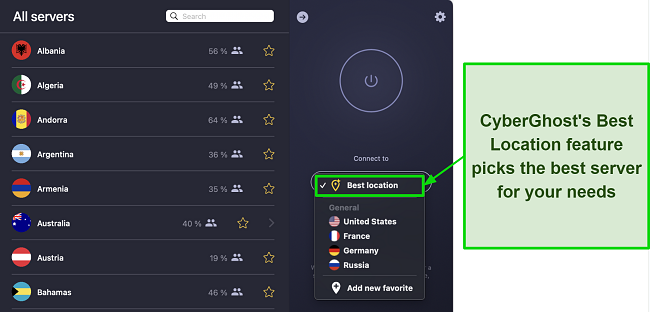
You’ll be much safer using CyberGhost than a free and public DNS server. This is due to a variety of security features, including:
- DNS & IP leak protection — secures your DNS requests and IP information.
- Externally audited no-logs policy — guarantees that your data and online actions are wiped from its servers, lowering the risk of cyber threats.
- Integrated ad and malware blocker — decreases the likelihood of encountering harmful ads or activating links loaded with malware, viruses, or trojans.
With optimized servers for streaming, gaming, and torrenting, CyberGhost offers better speeds than free, public DNS servers. These servers are specially designed to work for a specific purpose, giving you the best speeds, ping rate, and performance.
You’ll also be able to watch UHD streams on the following platforms:
| Netflix (US & more) | Disney+ | Hulu | Paramount+ |
| Max | Amazon Prime Video | Discovery+ | fuboTV |
| Foxtel | Starz | YouTube TV | …and more! |
The only minor con I identified while testing CyberGhost is its costly short-term plans, which come with a 14-day money-back guarantee. Nevertheless, CyberGhost’s long-term plans are affordable at just /month. The long-term also offers a 45-day money-back guarantee — the longest of any VPN on this list.
You can try out CyberGhost risk-free with its 45-day money-back guarantee. If you’re not happy with the service, you can get a full refund. I personally got my refund within 5 working days after contacting CyberGhost’s customer service team via email. The rep was very responsive and processed my refund request in less than 30 minutes.
Editor’s Note: Transparency is one of our core values at WizCase, so you should know we are in the same ownership group as CyberGhost VPN. However, this does not affect our review process, as we adhere to a strict testing methodology.
CyberGhost works with: Windows, macOS, Linux, Android, iOS, Raspberry Pi, Chrome, Firefox, PlayStation, Xbox, Nintendo Switch, Amazon Fire TV, Amazon Fire TV Stick, Chromecast, Roku, smart TVs, routers, and more.
2025 Update! You can subscribe to CyberGhost for as low as per month with a 2-year purchase (save up to %)!! This is a limited offer so grab it now before it's gone. See more information on this offer here.
3. Private Internet Access (PIA) — The Largest Server Network on the Market Ensures Your Anonymity From Anywhere
Key Features:
- 35,000+ servers in 91 countries, the largest network on this list
- NextGen servers with 10GB network cards
- Use its DNS servers on unlimited devices simultaneously
- Compatible with Windows, macOS, Android, iOS, PlayStation, Xbox, and more
- 24/7 live chat and customer support to answer any and all DNS queries
- A 30-day money-back guarantee
Private Internet Access (PIA) provides 35,000+ servers in 91 countries, the largest network of any VPN on the market. This ensures you can connect to DNS servers no matter your location.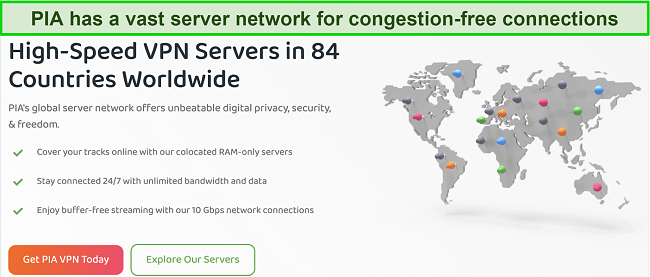
Its NextGen servers are optimized for speed and reliability, ensuring stable, speedy connections. I had an average speed of 75 Mbps on PIA’s servers, allowing me to browse and stream in UHD without lag or excessive buffering.
PIA’s supports UHD streams on Netflix US and the following international platforms:
| Amazon Prime Video | Disney+ | Hulu | Max | Showtime |
| Discovery+ | UKTV | Yle | Vudu | …and more! |
With prices starting at just /month, PIA can boost your security and anonymity with the following security features:
- DNS & IP leak protection — ensures your location, IP, and DNS details stay hidden from third parties (like your ISP).
- An automatic kill switch — instantly cuts your internet when the VPN disconnects, maintaining your security consistently.
- MACE ad and malware blocker — stop trackers, ads, and malware, minimizing the risk of harmful content infecting your devices.
Unfortunately, PIA operates within the US, a member of the 5 Eyes alliance — a knowledge-sharing network of international governmental organizations. However, an externally audited no-logs policy confirms that PIA doesn’t log or store any user data. This means that even if the government requests server data, PIA would have nothing to share.
You can try PIA out risk-free with its 30-day money-back guarantee. If it doesn’t meet your expectations, just reach out to its customer service to request a refund. I submitted an email ticket and got confirmation a day later — PIA refunded me within 5 days.
Editor’s Note: Transparency is one of our core values at WizCase, so you should know we are in the same ownership group as Private Internet Access. However, this does not affect our review process, as we adhere to a strict testing methodology.
PIA works with: Windows, macOS, Linux, Android, iOS, Chrome, Firefox, Opera, PlayStation 4, Xbox One, Amazon Fire TV devices, Chromecast, Apple TV, Roku, smart TVs, routers, and more.
2025 Update! You can subscribe to PIA for as low as per month with a 2-year purchase (save up to %)!! This is a limited offer so grab it now before it's gone. See more information on this offer here.
How to Change Your DNS Server Settings on Any Device
You can change your DNS server in many ways and on various devices. This includes using a VPN or connecting to a free, public DNS server on devices like Windows and Mac computers, Android and iOS phones, gaming consoles, smart TVs, and media players.
With a VPN
- Download and install a VPN. I recommend using ExpressVPN for its robust security and worldwide server network with private DNS.
- Connect to a VPN server. This creates a secure connection between your device and the VPN server, ensuring encryption for your internet traffic.
- Start browsing with DNS & IP leak protection. Private DNS servers resolve all DNS requests, ensuring you’re hidden from third parties like your ISP.
Windows
- Launch your “Control Panel” and select “Network and Sharing Center.”
- Open “Adapter Settings.” Then, select “Network Adapter,” right-click on the network adapter you’re using (e.g., WiFi or Ethernet), and choose “Properties.”
- Open “Internet Protocol Version Properties.” In the “Properties” window, choose either “Internet Protocol Version 4 (TCP/IPv4)” or “Internet Protocol Version 6 (TCP/IPv6)”.
- Choose DNS Server Settings. In the next window, select the option “Use the following DNS server addresses.” Then, enter your preferred DNS server IPs and save the changes by clicking “OK.”
- Test your DNS settings. Open a web browser and load any webpage. If the page loads without issue, the DNS change was successful.
macOS
- Open “System Preferences.” Then, click the “Network” icon.
- Select a network service. Select the network service you want to configure (usually your primary connection, either WiFi or Ethernet).
- Access DNS settings. Click on the “Details” button, then click on the “DNS” tab.
- Change DNS settings. Click “+” under “DNS Servers,” and type in the DNS address of your chosen public server. Repeat to add more servers.
- Save the changes. After adding the new DNS servers, click “OK” and “Apply” in the Network window to save the changes.
Android
- Launch the “Settings” app. Then, tap on “Network Settings”. Depending on your device, you might need to tap “More connections” first.
- Open “Advanced” settings and select “Private DNS.”
- Enter your new DNS server address. Tap on “Private DNS Hostname” and enter the hostname of the new DNS server, such as “dns.google” for Google’s public DNS.
- Tap “Save” to confirm your DNS changes. You can check if the DNS change was successful by visiting DNSLeakTest and following the instructions for a DNS leak test. If your new DNS server is shown in the result, the change was successful.
iOS
- Open “Settings.” Then, scroll down and tap on “Wi-Fi” to see a list of all WiFi networks you’re in the range of.
- Select the network. Tap the information button (i) next to the WiFi network you’re currently connected to. This will open the settings for that specific network.
- Change your DNS settings. Scroll down to the “DNS” section and tap “Configure DNS.” Select “Manual” and tap the red minus sign to remove the existing DNS server. Then, tap the “+ Add Server” and type in the new DNS server you want to use.
- Save the changes. Tap “Save” at the top right corner of the screen to save your new DNS settings.
Xbox
- Access “Network Settings.” Then, select Advanced settings > DNS settings > Manual.
- Change your DNS server address. To use Google’s DNS, you’d enter “8.8.8.8” as your primary DNS and “8.8.4.4” as your secondary DNS.
- Confirm the settings changes. Once you have entered your new DNS server addresses, confirm your changes. Your Xbox will now use the new DNS servers you’ve set.
Nintendo Switch
- Open “Settings.” Then, click Internet > Internet Settings.
- Select your WiFi network. The Nintendo Switch will start searching for WiFi signals. Once your network appears, select it and tap “Change Settings.”
- Change “DNS Settings.” Scroll down to “DNS Settings” and select “Manual.”
- Enter your new DNS server addresses. Now, you can enter the primary DNS and secondary DNS addresses you want to use. Once you’re done, click “Save” and restart your device.
PlayStation
- Visit your PlayStation settings. On the main dashboard, click Settings > Network > Set Up Internet Connection.
- Choose your connection type. Choose WiFi or LAN Cable, depending on what you’re using.
- Select “Custom.” This will allow you to manually adjust your internet settings.
- Input the new DNS addresses. Scroll down to see options for “Primary DNS” and “Secondary DNS.” Enter the DNS addresses you wish to use in these fields. Then select “Next” to save and apply your changes.
Samsung Smart TV
- Access the TV’s settings. Using your Samsung smart TV remote, press the “Home” button, then navigate to “Settings” on the menu bar at the bottom of your screen to set up a VPN on your smart TV.
- Open your network settings. Select General > Network > Network Status > IP Settings.
- Change your DNS server. Scroll down to “DNS Settings” and select “Enter manually”. This is where you’ll input the new DNS server addresses.
- Save and restart. Once you’ve saved your new settings, restart your TV.
Apple TV
- Open “Settings” on Apple TV and select “Network.”
- Select your WiFi network. In the Network menu, select the name of your WiFi network or ethernet connection, depending on how your Apple TV is connected to the internet.
- Change the DNS server settings. Once you’ve selected your network, scroll down and tap “Configure DNS.” By default, this will be set to “Automatic” — change it to “Manual.”
- Enter your new DNS server addresses. You will be given a text box to type in the new DNS server address you want to use. Make sure you enter it accurately, then select “Done.”
Editor’s Note: Transparency is one of our core values at WizCase, so you should know we are in the same ownership group as ExpressVPN. However, this does not affect our review process, as we adhere to a strict testing methodology.
FAQ: Public DNS Servers and VPNs
Why should I use a public DNS server?
A public DNS server can enhance your internet experience by providing faster response times and improving browsing speed. Compared to ISP-provided DNS servers, public DNS servers like those provided by Google and Cloudflare might offer better reliability and performance, as they are hosted on globally distributed servers. They also often include features like phishing protection and content filtering.
Public DNS servers also allow you to bypass regional restrictions and access content that might be blocked by your local ISP, providing more freedom and flexibility in your online activities. This makes public DNS servers a favorable option for many internet users seeking a more robust and versatile online experience.
Can public DNS servers track you?
Yes, public DNS servers have downsides, including a lack of privacy. Public DNS servers log your DNS requests, including the websites you visit, your IP address, and query times. Although this data may not personally identify you, it could be used to create a general outline of your online activities.
However, DNS providers differ significantly in data retention and usage policies. While some may store data temporarily, others anonymize it or don’t keep logs. If privacy matters to you, opt for privacy-focused DNS services or use one of the top-rated VPNs for improved anonymity.
How can I find the DNS server I’m using?
One way to find your DNS server is to visit a website like whatsmydns.net, which automatically detects and displays your DNS server information.
You can also use the following methods on your computer:
Windows
- Open Command Prompt.
- Type “ipconfig/all” and press Enter.
- Look for DNS Servers. The first IP address will be the primary DNS server address. If there is a second entry, that will be the secondary DNS server.
macOS
- Open Terminal.
- Type “nslookup google.com” and press Enter.
- You’ll find your DNS server address in the Addresses line.
How can I switch DNS servers?
You can switch DNS servers through your device’s network settings; the method depends on your device.
Windows
- Go to Control Panel > Network and Sharing Center > Change adapter settings.
- Right-click your connection, and select Properties. Then, click on Internet Protocol Version 4 (TCP/IPv4) or Version 6 (TCP/IPv6).
- Enter new DNS server addresses (like Google’s) and click OK.
macOS
- Go to System Preferences > Network.
- Select your connection. Then, click Advanced and navigate to the DNS tab.
- Add the new DNS addresses. Restart your network connection to ensure the new settings take effect.
Routers
- Access your router’s web interface by entering its IP address in a browser.
- After logging in, navigate to the Internet or WAN section. Locate the option labeled DNS Servers and replace the addresses with the new ones provided by your preferred DNS service.
*The specific steps may vary based on your router model and firmware.
How can I find the fastest DNS service?
To find the fastest DNS service from the best available public DNS servers, use online tools that measure and compare the response times of different DNS providers. Some popular tools include DNSPerf, DNS Benchmark, and Namebench. These tools typically run multiple tests and provide you with a list of DNS services ranked by their performance.
It’s worth noting that some DNS providers, such as Cloudflare and Google Public DNS, are known for their fast response times and global infrastructure. They are often recommended as reliable and speedy options.
Where are public DNS servers located?
A public DNS server’s location depends on the DNS server you’re connected to and using. The best DNS servers are part of global networks, allowing you to connect to servers worldwide, improve the reliability of your connection, and increase your speeds, as there will always be a server close by.
How can I test a DNS service?
To test a DNS service and compare the best Public DNS Servers on Windows, open Command Prompt (press Windows key + R, type “cmd,” and hit Enter), then use the “nslookup” command followed by a domain name to check if the DNS resolution is successful.
For Mac, open Terminal (press Command + Space, type “terminal,” and hit Enter), and again, use the “nslookup” command followed by the domain name. This will provide you with the IP address associated with the domain, indicating successful DNS resolution.
Which public DNS servers are best for gaming?
Google DNS, Cloudflare DNS, and OpenDNS are among the best public DNS servers for gaming. By switching the DNS server on your PS4, PS5, Xbox, or Nintendo Switch to any of these options, you can benefit from optimized settings that minimize latency, enhance response times, and overall improve your gaming experience.
I recommend using a top VPN with DNS when you play Call of Duty online (and other online games). This will protect you from cyberattacks, while also maintaining fast speeds for interruption-free gaming.
Are free DNS servers safe?
No, free DNS servers are not totally safe. Some can pose security risks, including data breaches, deceptive attacks, and redirection to malicious websites. To ensure a safer browsing experience, choose a reputable DNS service provider that prioritizes security and has a proven track record of protecting user data.
Alternatively, combining a DNS with a VPN is a wise choice. The best free VPNs on the market not only encrypt your data but also include a DNS leak protection feature, safeguarding you from DNS-related risks.
Choose the Right DNS Server for Your Needs
Choosing the right DNS server is essential for a smooth internet experience — it affects your speed, security, and privacy. If speed is your #1 priority, you may want to try Google Public DNS or Cloudflare DNS; both with low latency and fast connection speeds.
For enhanced security, consider DNS servers that offer features like DNSSEC and DNS over HTTPS, such as OpenDNS and Quad9. These features ensure a more secure and private browsing experience, protecting your data from potential threats and unauthorized access.
Using a VPN with DNS can further enhance your online security and privacy. I found ExpressVPN to be the fastest, most reliable, and most secure VPN. Don’t take my word for it — you can test ExpressVPN completely risk-free. With a 30*-day money-back guarantee, you’re covered. When I tested this, I got my refund in just 4 working days.
*Please note that ExpressVPN’s generous money-back guarantee applies to first-time customers only.
Summary — The Best VPNs With Private DNS Servers in 2025
Editor's Note: We value our relationship with our readers, and we strive to earn your trust through transparency and integrity. We are in the same ownership group as some of the industry-leading products reviewed on this site: ExpressVPN, Cyberghost, Private Internet Access, and Intego. However, this does not affect our review process, as we adhere to a strict testing methodology.

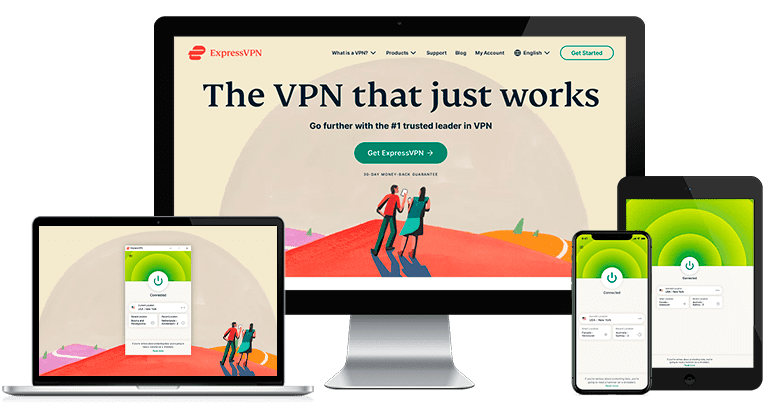
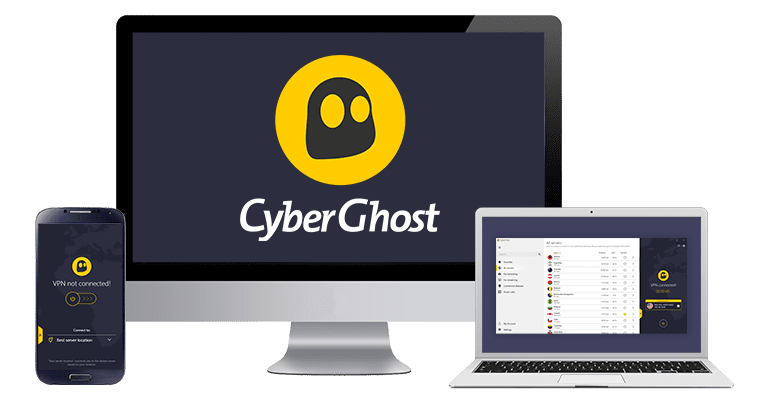
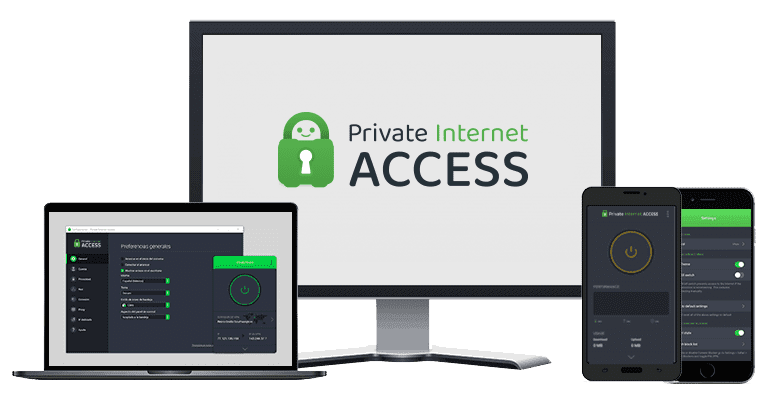


Leave a Comment
Cancel